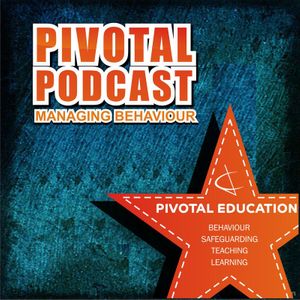Why all educators need to care about Mine Conkbayir’s frontal cortex – 184
Pivotal Podcast - A podcast by Pivotal Education

Categories:
Ollie spoke to Mine Conkbayir this week about the brain and why we all need to know so much more about it than we do. She helps to debunk some myths which are still very prevalent in today’s schools and presents a high level of challenge to all educators to examine their practice. Mine is an award-winning author, lecturer and trainer. She has worked in the field of early childhood education and care for over 17 years. Mine is the winner of the Nursery Management Today (NMT) Top 5 Most Inspirational People in Childcare Award. She is the founder of the Cache Endorsed Learning Programme, Applying Neuroscience to Early Intervention. Mine is currently collaborating with the Metropolitan police force, undertaking independent research which explores the connection adverse childhood experiences (ACE’s) and criminality. She is also undertaking a PhD in early childhood education and neuroscience to develop her work in the complex and challenging subject of infant brain development. Her key objective is to bridge the gap between neuroscience and early years discourse and practice. She hopes that her research will provide the necessary evidence to seek solutions to this persistent issue, with the ultimate goal of enhancing provision for babies, children and young adults. How do we know what’s valuable, evidence-based neuroscience which we can use with learners? In fact, Mine says there is a wider problem than this. For many years Early Years and other educators have been told not to touch neuroscience. However, evidence no shows us that the foundation is laid in those early years. Trauma and adversity in the home means that more and more children are entering our schools unable to exercise the skills and qualities they need to succeed. These children are then labelled and excluded at younger and younger ages and given drugs to manage their behaviour. Mine believes all of this is avoidable. Children who are in ‘flight or fight’ mode cannot learn and it’s their stress which causes that reaction. Mine believes that the situation we have now could have been avoided if the study of evidence in neuroscience had been embedded in all teachers’ initial training. It also now needs to come from the Department for Education. Teachers who don’t understand what’s happening inside the brain of a child who has experienced trauma, abuse or neglect are in danger of simply ‘managing their challenging behaviour’ rather than also supporting the child’s mental wellbeing. Strategies to support these children in school Mine says that her mantra is ‘love each child’. This has to be combined with the abandonment of isolation for disruptive behaviour. Rather than enforcing ‘time out’ she recommends a ‘time in’ approach – nurturing each child who hasn’t been given the support or the emotional vocabulary or toolkit to deal with what they are feeling. Some children need ‘safe havens’ that they know they can go to when they feel they are about to have an aggressive episode. What are the effects of ‘toxic stress’ on the young brain? Children might: * be aggressive * be hyper aroused * be hyper vigilant – even when there are no triggers around * experience their brain and body being on alert all the time because of their high cortisol levels The children who experience this constantly end up ion social isolation in the school, they fail at GCSE level, they don’t go to college and are more likely to be involved with gangs, teenage pregnancy, alcohol and drug abuse. In adults, this can lead eventually to higher rates of conditions such as heart disease and premature death. So children who are not being supported to practise self-regulation can end up as seriously damaged adults.